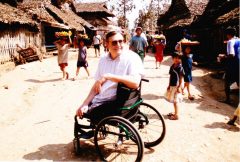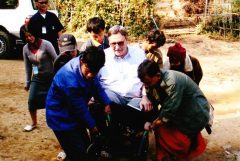A personal reflection from LERRN Project Director, James Milner
It is with great sadness that I share the news of the passing of my dear friend and LERRN partner Prof. Gil Loescher on 28 April 2020.

Gil Loescher in Thailand, 2006
Gil was a gentle giant of refugee studies. His work on refugee issues over the past four decades helped define refugee studies as a field. His writings on refugees and world politics made clear how humanitarian responses alone are insufficient to respond to the political causes of displacement. And his research on UNHCR traced in meticulous detail the many constraints under which UNHCR functions, and the range of interests that frustrate the organization’s efforts to realize protection and solutions for refugees.
His work inspired generations of researchers, policymakers and practitioners engaged with the refugee cause.
But more important than his work was who he was as a person. Gil was humble, empathetic, thoughtful, and curious. Gil cared about people and cherished the chance to meet so many remarkable individuals through his research. He always started an interview by taking time to learn more about the person he was interviewing – who were they, where they were from, where they were last posted. Gil cared deeply about his fellow human beings.
And he was always moved and inspired by the courage and resilience of refugees. In 2006, just three years after being injured in the bombing of the UN Headquarters in Baghdad, Gil and I were invited to visit Thailand to participate in the process of encouraging reform in the Royal Thai Government’s refugee policy. We visited camps along the Thai-Myanmar border and met with dozens of refugee organizations and leaders, NGO representatives, and UNHCR colleagues.
The moment that I will never forget is when we visited a Handicap International prosthetics lab in one camp. We arrived early in the morning when the soil was still damp and slippery. We realized that the HI lab was at the top of a long set of stairs, cut into the mud. There was no way that Gil could get there in his wheelchair. But then, six refugees, themselves amputees using prosthetics, came down the stairs and through a series of smiles and nods, indicated what they wanted to do: they carried Gil and his chair up the steps so that he could see the lab for himself. It was the most moving testament to refugee determination either of us had ever seen.

Going up! Gil getting ready to be carried up to the lab, Thailand, 2006
The loss of Gil is immeasurable. His wisdom, compassion and unwavering belief that positive change is possible will be forever missed. His death leaves a gaping hole in my life.
But more important is to remember the enduring message of Gil’s work: That collective action and international cooperation is essential to ensure that the refugee regime can deliver on its commitment of protection and solution for refugees.
We cannot ignore the interests and politics that condition our ability to forge this cooperation. And if we understand these interests, we can start working for change.
As Gil told me many times, lasting change takes time.
Now that he is gone, we must not forget the lessons he taught to so many – and work even harder to put those lessons into practice.